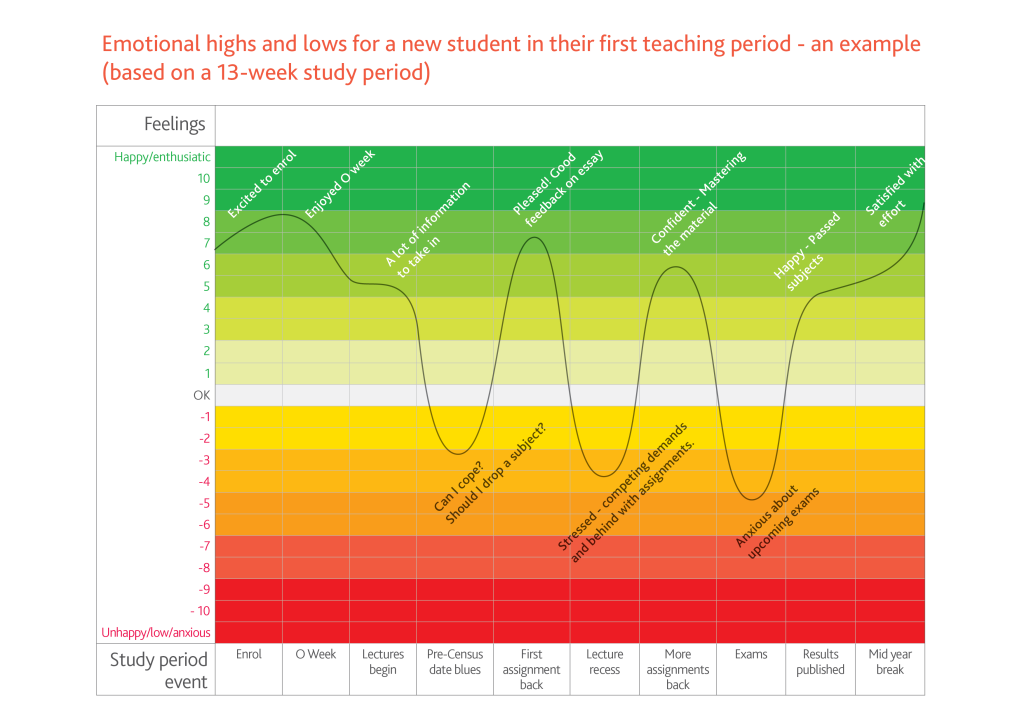Transition to Uni
Meghan Boland and Tony Hewitt

Introduction
University study involves an educational transformation that can positively change a student’s future prospects and quality of life. However, in order to undergo any transformation, you must experience a period of adjustment and transition. Commencing university is one of those major transition periods in your life that can be exciting as well as challenging, so it is normal to experience some emotional ups and downs in your first study period.
“A lot of people resist transition and therefore never allow themselves to enjoy who they are. Embrace the change, no matter when it is; once you do, you can learn about the new world you’re in and take advantage of it.”
– Nikki Giovanni
Highs and Lows of University Life
Commencing university is an exciting time and students commonly feel happy and enthusiastic about their decision to study a chosen field. Your first study period at university will be a stimulating experience, but it is also a busy time as you learn about the university environment, academic expectations, learning technologies, where to go for help, as well as your course content.
These new and exciting challenges can cause students to feel anxious and unsure at various times, particularly around assessment periods. You may experience a wide range of feelings and moods and feel like you are on an emotional roller coaster in your first study period at university. Many students incorrectly believe that everyone is coping except for them, however, in reality everyone is riding the same ups and downs and you are not alone. So, remember to talk to your fellow classmates about how you are feeling (the good, the bad, and the ugly) as they will be having similar experiences and you can work through those challenging periods together.

Differences between High School and University
For most new university students, their last education experience was in secondary school, so it is important to understand what the differences will be in a higher education setting. University is an adult learning environment, which means there is a strong emphasis on students becoming independent learners and managing their own study responsibilities, as shown below.
High School
- Attendance is compulsory and classes are held five days per week
- 75 per cent classes and 25 per cent independent learning
- Teachers deliver content face-to-face
- Teachers direct learning and remind students about study responsibilities and assessment due dates
- Teachers approach students if they believe they need assistance
- Teachers highlight important information
- Teachers will review draft versions of assignments
- Assessment is more frequent and covers smaller amounts of material
- Parents receive biannual reports with grades A to F, and have access to parent-teacher interviews
University
- Students choose to enrol in university and class times and days vary
- 25 per cent classes and 75 per cent independent learning
- Lectures may be videoconferenced or delivered through online learning platforms
- Students are independent learners responsible for managing their study workloads and meeting assessment deadlines
- Students are expected to monitor their own progress and seek help if needed
- Students must review course and class content and identify important concepts
- Lecturers do not provide feedback on drafts
- Assessment is less frequent and covers larger amounts of learning material
- Results are only available to students and graded from High Distinction to Fail
Activity
1. Identify three things you are looking forward to about studying at university.
2. Identify three challenges that you might face in your first study period and consider proactive steps you can take to overcome each obstacle.
References
James Cook University. (2023). GetReady4Uni: Module 1 – Transition to Uni. https://www.jcu.edu.au/getready4uni/transition-to-uni

